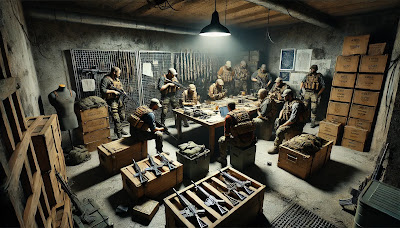 |
| 🔦 A Chilling Glimpse into Hidden Militia Operations. Where weapons stockpiles and whispered plans may collide in your neighborhood. 🚨 |
In the
shadows of international trade and global politics lies a thriving underground
economy: the arms smuggling networks. These black-market pipelines deal in
weapons of war, moving AK-47s, grenades, and even surface-to-air missiles
across borders with little regard for the havoc they leave behind. While these
weapons often spark chaos in far-off conflict zones, there’s a disturbing and
growing trend that brings the danger much closer to home. The very same weapons
are ending up in the hands of violent domestic militias within the United
States—groups whose ideologies and actions threaten public safety, democracy,
and lives.
Consider this: in 2020, federal
authorities uncovered a chilling plot by militia members to kidnap Michigan
Governor Gretchen Whitmer. These individuals, fueled by extremist beliefs, had
been training with paramilitary precision and stockpiling weapons. While some
of their arsenal was obtained domestically, investigators found clear ties to
international smuggling networks that made advanced weaponry accessible to
people who should never have had it in the first place.
This isn’t an isolated incident. Across
the U.S., groups like The Base, the Oath Keepers, and Atomwaffen Division have
gained notoriety for their alarming stockpiles of military-grade arms and their
willingness to use them.
How do
these weapons make their way from far-flung conflict zones into the hands of
homegrown extremists? The answer is as complex as it is terrifying. Global arms
smuggling operates like a dark mirror to legitimate trade. Weapons flow from
war zones in Eastern Europe, North Africa, and the Middle East into the black
market, often through corrupt intermediaries, rogue states, or unscrupulous
dealers.
Smugglers use a combination of bribery,
fake documentation, and covert routes to move these arms across borders. Some
of these weapons are resold to buyers overseas, including U.S.-based
individuals or groups willing to pay a premium to arm themselves with firepower
far beyond civilian capabilities.
This deadly supply chain is fueled by
global instability. Wars, coups, and lawless regions create a glut of surplus
weapons that smugglers scoop up and redistribute to the highest bidder. With
tools like encrypted communications and darknet marketplaces, domestic militias
are able to connect with international arms dealers more easily than ever
before. This creates a seamless pipeline where foreign conflicts bleed into
domestic ones, arming violent extremists within the U.S. who are preparing for
their own wars—whether against the government, rival groups, or innocent
civilians.
The consequences of this connection are
not just theoretical. They play out in real-life tragedies. The armed standoff
in Charlottesville in 2017, where white supremacists carried semi-automatic
rifles in public and clashed with counter-protesters, is one such example. In
other cases, federal agents have intercepted shipments of grenades and rifles
intended for use by militia groups, narrowly averting deadly attacks. The
danger is clear: with easy access to global arms, these domestic groups have
grown bolder, more organized, and more dangerous.
This terrifying reality is at the heart of
Operation Skyfall,
a spy thriller that explores the intersection of international arms smuggling
and homegrown terrorism. The story drops readers into a high-stakes mission led
by CIA operative Corey Pearson and his elite team, where the lines between
foreign and domestic threats blur dangerously. One gripping scene highlights
the smuggling of surface-to-air missiles intended for a domestic attack at
Miami International Airport—a chilling fictional scenario that feels all too
plausible given current trends.
This is not a problem confined to faraway
places or extreme ideologies—it’s one that puts all of us at risk. The blurred
line between foreign and domestic threats means that conflicts half a world
away can have very real consequences in our neighborhoods. The weapons crossing
borders aren’t just tools of war—they’re tools of terror. And as we’ve seen,
they don’t just stay in the shadows. They find their way into our backyards.
The time to act is now. By addressing the
global-local nexus of arms smuggling and domestic terrorism, we stand a chance
of keeping our streets, homes, and communities safer. In the meantime, works
like Operation Skyfall
remind us of the grim reality behind the fiction—a world where every move
matters, the stakes couldn’t be higher, and the cost of inaction is
unthinkable.
Robert
Morton, a member of the Association of Former Intelligence Officers (AFIO), is
an accomplished author of the Corey
Pearson- CIA Spymaster Short Story
series. Drawing from real-life intelligence operations, he crafts gripping
tales that pull readers into the high-stakes world of espionage. Each story
offers a thrilling escape—and can be enjoyed in just 20-30 minutes. Perfect for
anyone craving fast-paced spycraft!






No comments:
Post a Comment